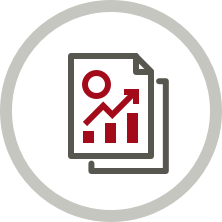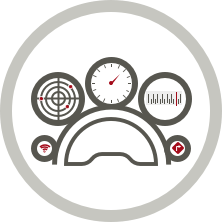The Data Driven Business
A maturity perspective
More than an abstract aspiration
What is a data driven business?
Few have so far made the grade
When 480 organizations were objectively assessed during a recent study*, most were still on
their "data maturity" journey.
A small minority qualified as being genuinely data driven.

Data starved
Relatively chaotic approach to handling data, leading to poor business visibility and higher data-related risk

Data sustained
Respectable level of basic competence, but patchy and often backward-looking business visibility

Data empowered
Good on-demand availability of consistent, complete, upto-date and forward looking business insights

Data driven
Continuous and often realtime insights, delivered proactively and in context across the entire business
Data driven businesses perform better
Using a scorecard based on nine indicators of business efficiency, effectiveness and success, aggregate performance consistently aligns with data maturity.
Are you doing as well as you think?
When will you become data driven?
Planning and preparation
Forewarned is forearmed. Take note of the hurdles that can stand in the way of progress:
Lack of senior
managerial support
Cultural resistance to
change and transformation
Internal politics
Poor KPI alignment
across the organization
Lack of knowledge and
skills within business units
Too much reliance on
central analytics group
Cost/budget related
issues
Too much reliance on
legacy infrastructure
Risk & governance
related concerns
Fragmentation of data
(e.g. too many silos)
You don't have to go it alone
How valuable would services be from suppliers to help with the following?
Groundwork
-
82%
Strategy and planning, defining needs, setting objectives, desired outcomes
-
88%
Assessing the data you have and where it sits, identifying tools used
-
81%
Co-creation: working with suppliers to define projects and identify outcomes
Architecture
-
81%
Defining data architecture to deliver business value
-
80%
Architecture and design, how data should be held/classified/protected
Control & OPs
-
83%
Defining security and
data governance -
80%
Defining operational processes and training requirements
*For a more detailed presentation and discussion of the research, please see the report entitled: “The road to becoming a data-driven business” which is available for download here.

Copyright Freeform Dynamics, 2020
